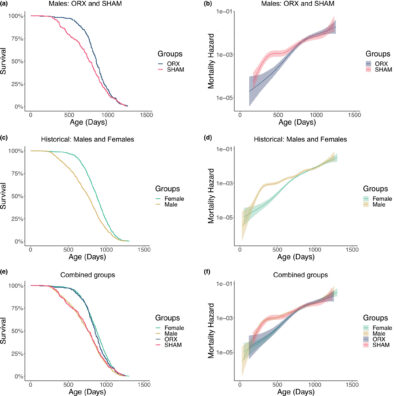Research published in Aging Cell has discovered that castrated male mice show similarities to females in growth and lifespan [1].
It is widely known that women outlive men on average, but the biological reasons are still not fully understood. As it is challenging to experimentally test these reasons in humans, researchers turned to a special breed of mice that mimics age-related mortality differences between men and women. Their hypothesis was that testicular hormones released after puberty are responsible for sex-specific differences in lifespan.
The median lifespan was increased
To test sex-specific lifespan differences, the authors of this study castrated one group of male mice before the onset of puberty, with a control group given a sham operation instead. They observed that castration before puberty affected early-to-midlife mortality, decreasing the mortality of these males to that of females.
The median lifespan of castrated mice also increased. However, maximum lifespan and mortality after midlife were not significantly affected by castration, which was to be expected because mortality between the sexes doesn’t differ at that point in these mice’s lives.

Castration affects male growth rate
In the breed that these researchers used, male mice weigh more than females throughout their lives [2], and higher body weight is correlated with decreased lifespan [3]. These researchers asked whether the testes influence body weight and growth and whether that results in a shorter lifespan in males.
They observed that castration resulted in a reduced growth rate between 1 and 6 months. They hypothesized that a reduction in insulin-like growth factor 1 (IGF-1), which plays a role in lifetime growth [4], could be the reason. To test that, they measured its levels in 4-month-old mice. However, they found no significant difference between IGF-1 levels in the castrated group and the control group, which means that the mechanism is different.
Increased duration of growth
Normally, the male mice used in this study stop growing around 12 months, and females continue to grow until 18 months. Castration changed this, resulting in reduced body weight at 6 months. However, at 12 months, the body weight of males caught up with sham-operated mice, and at 18 months, it exceeded that control group. This timeline extends the growth of male mice by 6 months, similar to female mice.
This is in contrast to caloric restriction and growth hormone/IGF-1 deficiencies, which are both associated with longer lifespans [5, 6] but decrease rather than increase body weight. These results suggest that simple changes in size may not have direct effects on lifespan. Instead, they suggest that it is the duration of growth that is important, as was already proposed in regards to caloric restriction [5].
Testicular hormones play a role
With these results in hand, this study’s authors hold that sex-specific differences in aging are, at least in part, governed by testicular hormones following puberty. However, it remains unknown whether a specific exposure period is crucial, and the specific hormones involved in this difference were not discovered.
More research into these mechanisms is necessary to discover potential treatments. While performing these sorts of experiments on human beings is clearly unethical, it may be possible to develop therapeutics that use the mechanisms discovered in mice, extending lifespan while preserving the sexual functions of the testes.









































